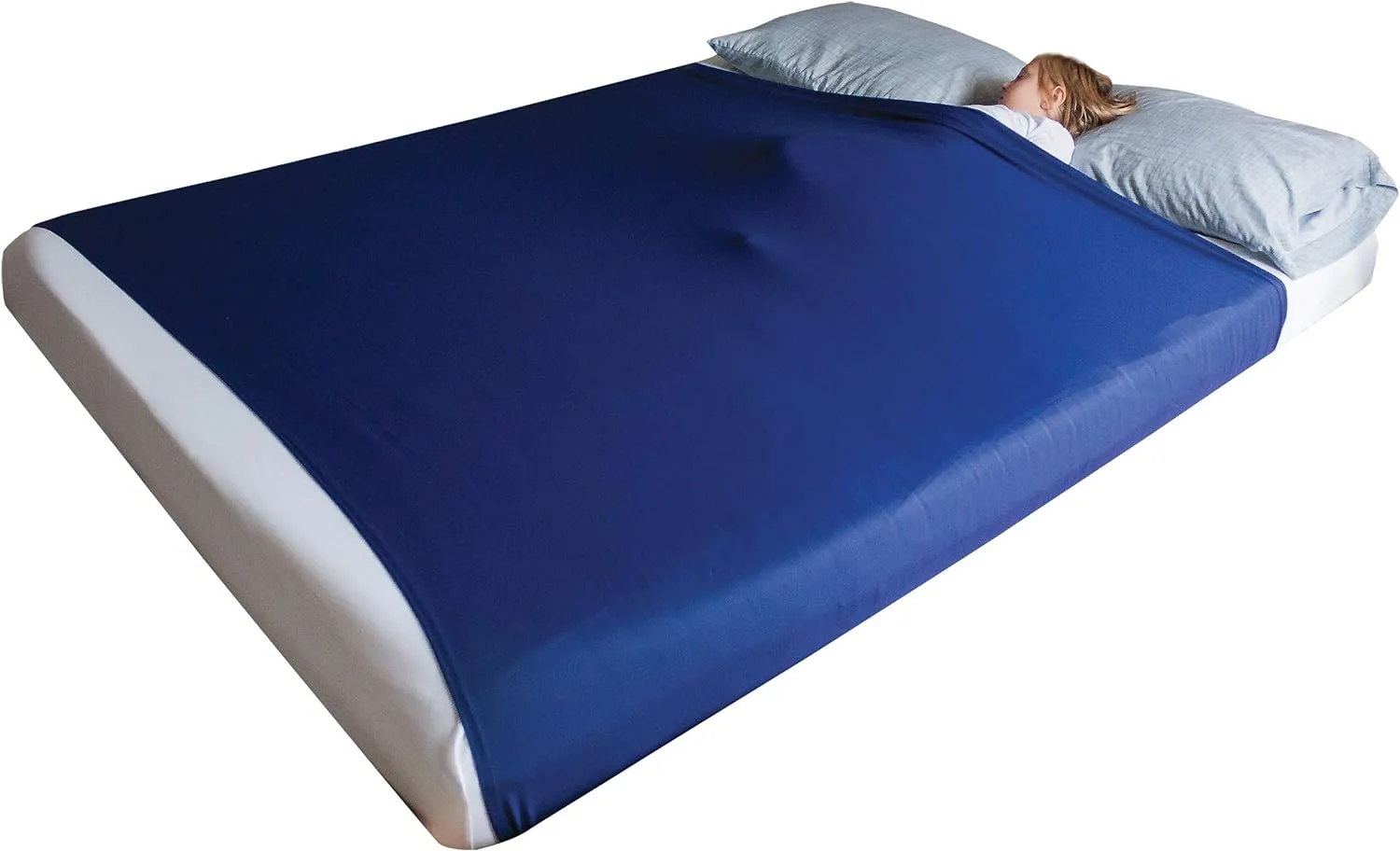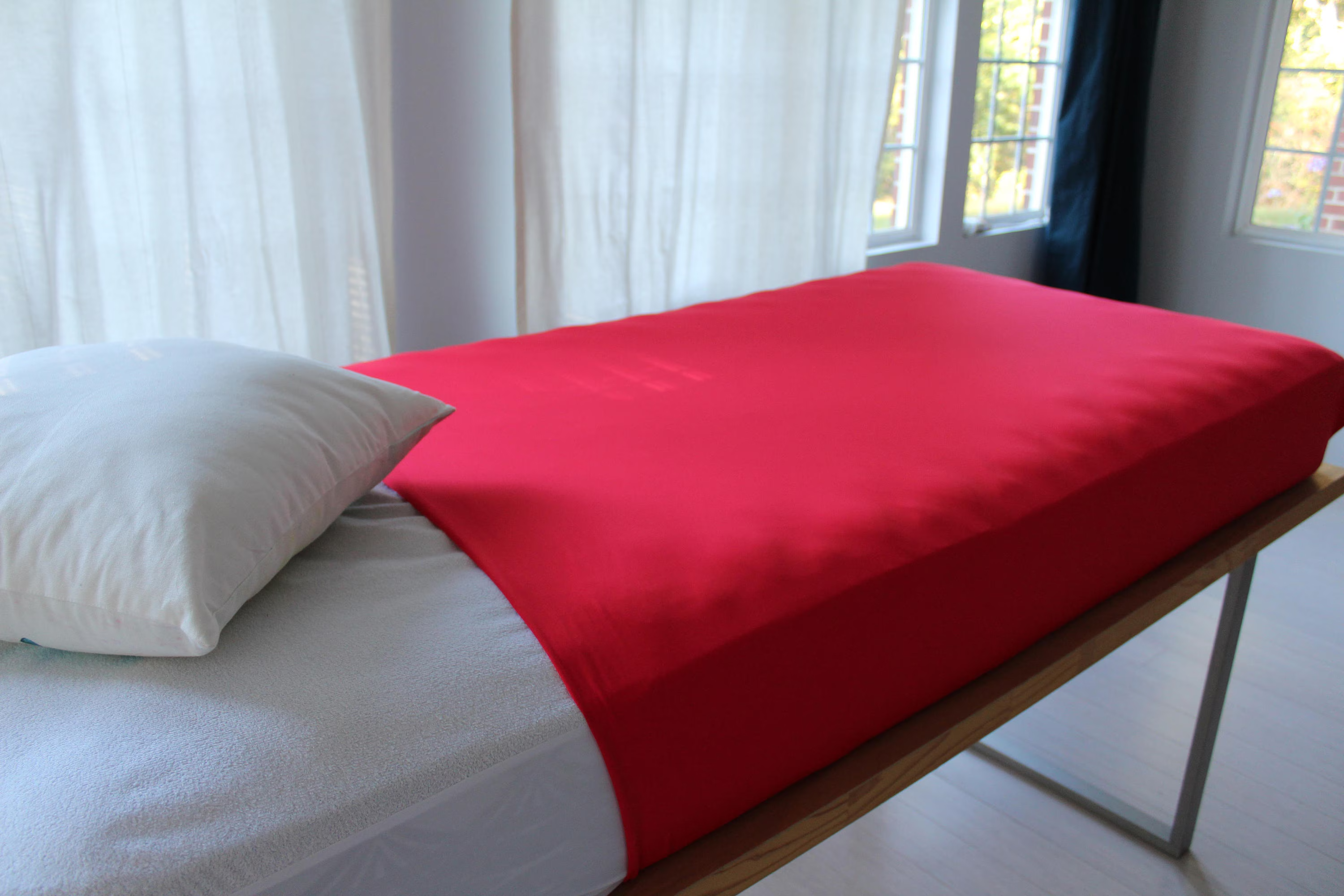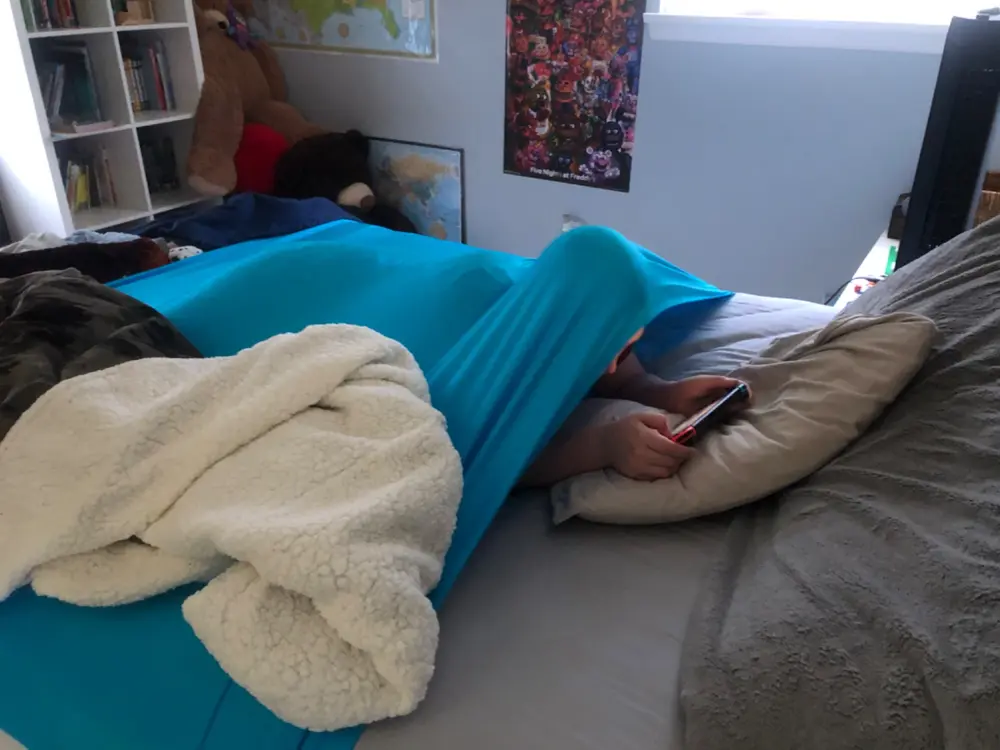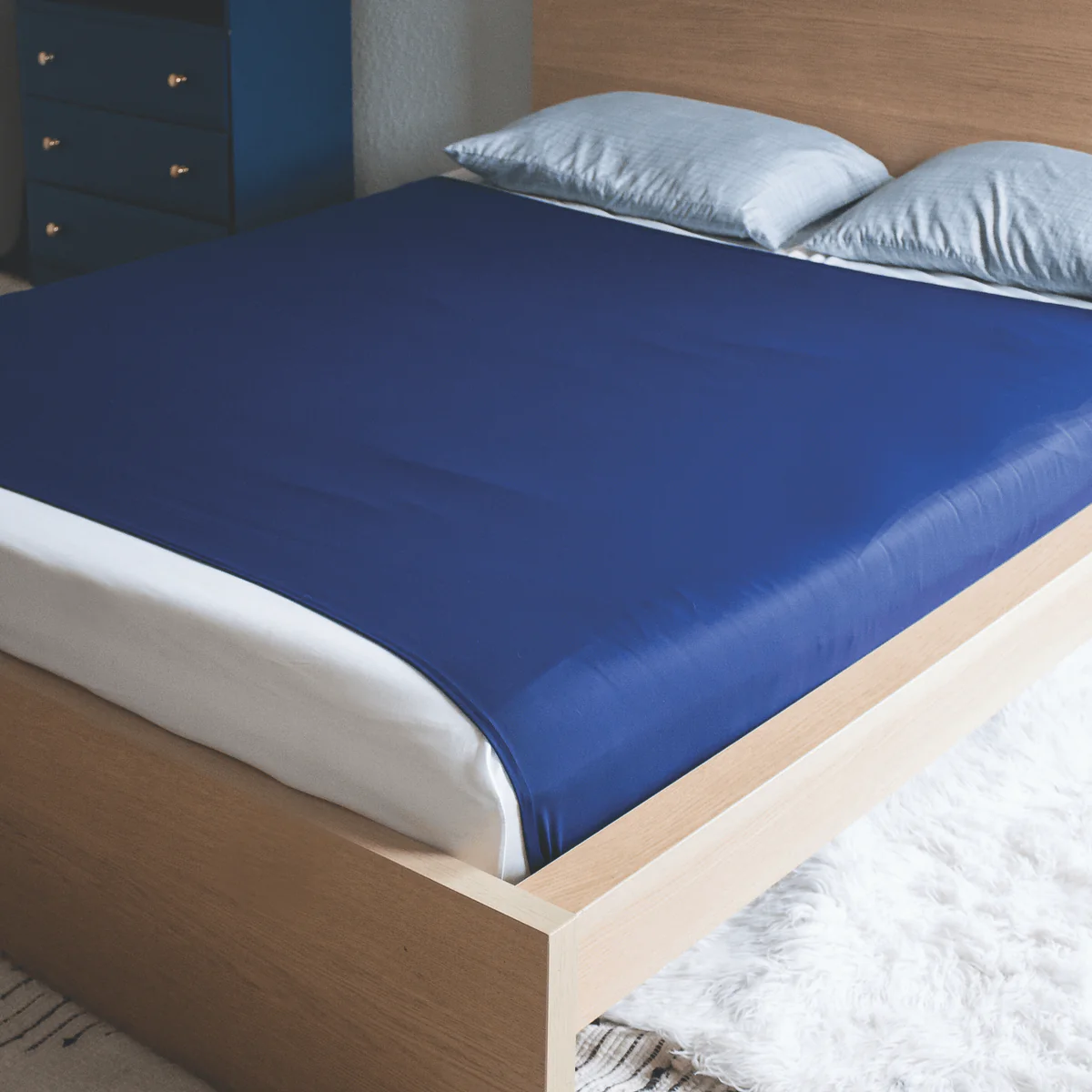Compression sheets are becoming increasingly popular every year, especially in the healthcare industry due to their various health benefits and advantages, but many households now include compression sheets as a part of their bedding, and that’s mainly because of their snug fit, which creates a calming and comforting feel that many people seek and enjoy.
What are compression sheets?

Compression sheets are a special type of sheet that is placed directly on top of your mattress or on top of your bed sheets. They are a valuable tool in the world of healthcare and rehabilitation. These sheets are designed to provide gentle compression or a snug hug to the body, helping to reduce swelling and improve circulation.
That’s why a sensory compression sheet is a popular choice for individuals looking to improve their sleep quality and overall comfort, as compression sheets provide a snug fit around the mattress, which helps to reduce movement and create a more secure sleeping environment.
How does a compression sheet work?
Compression sheets exert pressure evenly, which helps to reduce swelling, inflammation, and pain by promoting blood flow and reducing fluid buildup. The compression also provides support to the underlying tissues and structures, helping to stabilize joints or muscles.
The effectiveness of a compression sheet can also be enhanced by incorporating additional features such as adjustable straps or gel inserts. These features allow for customizable levels of compression and targeted pressure on specific areas.
For example, a compression sheet with adjustable straps can be tightened or loosened based on the individual's needs, providing optimal support and comfort.
Pros of compression sheets

Improved Support
One of the main advantages of sensory compression sheets is their ability to offer additional support to the body, particularly for individuals with joint or muscle pain. By applying gentle pressure to the body, compression bed sheets can help alleviate discomfort and promote better sleep.
Durability
Compression sheets are highly durable and long-lasting, as they are made from high-quality materials that are resistant to wear and tear.
This means that users can expect their compression sheets to maintain their shape and effectiveness over time, making them a wise investment.
Hypoallergenic
Compression sheets are considered to be hypoallergenic and resistant to dust mites, making them a great option for individuals with allergies or sensitivities.
Improved Sleep Quality
Compression sheets provide a therapeutic deep-pressure technique that proves that they drastically enhance the quality of your sleep because they create a calming and relaxing sensation.
Joint and Muscle Pain Relief
Two crucial components of pain management are blood circulation improvement and inflammation reduction, both of which the sheets' gentle pressure can aid in.
This can be especially beneficial for individuals suffering from conditions such as arthritis or muscle strains.
Sensory Relief
As sensory bed sheets, compression sheets are a great choice for Individuals with sensory processing disorders or sensory sensitivities who will experience a calming effect on the nervous system as a result of the pressure the sheets apply, which can make them feel more at ease and grounded.
Cons of compression sheets

Price Range
One of the biggest drawbacks of compression sheets is that they tend to be more expensive than regular bed sheets due to their specialized design and materials, so if you’re on a tight budget, it might not be the best choice for you.
May Not Be Suitable for Everyone
Some individuals may find the snug fit of compression sheets to be uncomfortable or restrictive.
Even though the pressure these sheets produce can be advantageous for many people, some might prefer a looser fit that allows for more movement while they sleep.
Potential for Overheating
Some models of compression sheets in the market don’t have proper cooling features, which might present an issue for some people as it might trap heat and cause overheating, If you’re a hot sleeper, then you need to find a compression sheet with sufficient cooling properties.
Types of Compression sheets
By Coverage
- Full-Body Compression Sheets: Full-body compression sheets are designed to completely cover the object or material they are applied to. These sheets are commonly used in the healthcare industry for wound care and bandaging purposes.
- Sectional Compression Sheets: Sectional compression sheets only cover a specific area or portion of the object where precise pressure application is required.
By Fastening Mechanism
- Wrap-Around Sheets: Wrap-around sheets are versatile and can be used on various body parts, such as the knee, ankle, or elbow. These sheets are made of elastic material that can be easily wrapped around the affected area and secured.
- Sock-Style Sheets: sock-style sheets are specifically designed for compression on the foot and lower leg, as they resemble a sock, and they are made of stretchable fabric that provides gentle compression to reduce swelling and improve blood circulation.
People Who Should Get Compression Sheets
People Who Have Undergone Surgery
One group of people who should consider using compression sheets is those who have recently undergone surgery.
Surgery can often result in swelling and inflammation, which can be uncomfortable and slow down the healing process. Compression sheets can help reduce this swelling, allowing for faster recovery and improved comfort.
Additionally, compression sheets' improved circulation can lessen the risk of blood clots, which are common after surgery.
Athletes
Athletes are another group of individuals who can benefit from using compression sheets. Whether it’s a professional athlete or someone who enjoys regular exercise, compression sheets can aid in post-workout recovery.
By applying gentle pressure to the muscles, these sheets can help to reduce muscle soreness and speed up the healing process. This is especially important for athletes who engage in high-intensity workouts or long training sessions.
Those Who Want an Alternative to Weighted Blankets
Some people don’t like the weight and heftiness of weighted blankets, but they still want to experience the therapeutic deep pressure technique that the weighted sheets provide, which eases muscle soreness, reduces anxiety, and improves sleep quality, and the compression sheet provides a very similar feel.
Individuals with Chronic Pain
Individuals with chronic conditions such as lymphedema or venous insufficiency can also benefit from using compression bed sheets. These conditions often result in swelling and fluid retention, which can be managed with the use of compression therapy. Compression bed sheets provide a convenient and comfortable way to apply consistent pressure to affected areas, helping to reduce swelling and improve overall quality of life.
People with Anxiety or Restlessness
The snug fit feeling of the compression sheet provides a deep pressure therapeutic technique that decreases the production of the cortisol hormone and increases the production of the melatonin hormone, which enhances the mood, lowers the heart rate, and promotes relaxation, which can be very helpful for people suffering from anxiety or ADHD.
Children with Sensory Processing Issues
Children with sensory processing issues often experience heightened sensitivity to touch, sound, and movement. This can result in feelings of distress and discomfort in everyday situations. Sensory compression sheets can help alleviate these feelings by providing gentle and consistent pressure to the body. The pressure acts as a soothing mechanism, helping to reduce anxiety and promote a sense of calmness.
People Who Should Avoid Compression Sheets
People with Claustrophobia
People who suffer from claustrophobia might not enjoy the snug fit of the compression sheet, as they might feel trapped inside it, and the compression sheet could trigger their phobia and increase their anxiety.
Individuals with Circulatory Issues
People who suffer from circulatory issues might find it better to steer clear of compression sheets, as using them in these cases may exacerbate the problem by further restricting blood flow and potentially leading to complications.
Pregnant Women
It’s highly recommended that pregnant women avoid using compression sheets, weighted blankets, or any bedding that could add pressure to their stomach to eliminate any forthcoming risk that might affect the pregnancy negatively.
People with Open Wounds or Skin Conditions
Compression sheets are designed to apply pressure to the affected area, which can be beneficial for wound healing.
However, if a person has an open wound or skin condition, using compression sheets can be detrimental. The sheets' pressure can exacerbate the already compromised skin's damage, slow down the healing process, and increase the risk of infection.
What to consider before buying a compression sheet
Compression level
Sensory compression sheets should offer a snug fit that applies consistent pressure to the body, promoting circulation and reducing swelling. It is important to choose a compression level that is appropriate for your needs, whether it be mild, moderate, or firm compression. This will depend on the specific medical condition you are dealing with and the recommendations of your healthcare provider.
Material and Breathability
It is crucial to select sheets that are made from high-quality, breathable fabric. Look for sheets that are moisture-wicking and have antimicrobial properties to keep you comfortable and prevent the growth of bacteria or odor-causing agents.
Additionally, choose sheets that are durable and can withstand frequent washing without losing their compression abilities or shape.
Size and fit
Size and fit are vital factors to consider before purchasing compression sheets. It is essential to measure your mattress accurately and choose a size that corresponds with your measurements.
Ill-fitting compression sheets may not provide the desired level of compression and could be uncomfortable to wear.
Some manufacturers offer size charts or guidelines to help you select the right size based on your measurements.
Budget
While cost should not be the sole determining factor, it is important to find a product that offers good value for your money. Research different brands and read reviews from other customers to ensure that you are investing in a reputable and reliable product.
FAQs
Is it safe to use a compression sheet every day?
Yes, you can use compression sheets daily, as long as they provide the comfort needed for you and as long as they're not affecting your health negatively in any way. So you should decide for yourself if compression sheets are safe for you or not. If they're affecting you negatively, then you need to consider using another type of sheet.
Are there any health risks associated with compression sheets?
Compression sheets are generally safe to use; however, in some rare cases, they might have some risks associated with them, such as triggering a claustrophobic feeling because of their snug fit and constant pressure, or skin irritation if the material isn’t hypoallergenic.
Can kids use compression sheets?
Children can use compression sheets if they’re old enough and aware enough, so the safest option is to go back to your health adviser and ask are compression sheets safe to use for your kids before deciding whether to let them use them or not.
What is the price range of compression sheets?
There is a very wide range of prices for compression sheets, and it varies drastically from one model to another based on the material, the compression level, and the size, so if you’re thinking of buying a compression sheet, keep these factors in mind as they will have an impact on the price of the sheets.
Conclusion
Compression sheets offer a range of benefits for individuals seeking improved sleep quality and comfort. They provide additional support and pressure relief for those with joint or muscle pain, are durable and hypoallergenic, and can create a secure sleeping environment.
However, it is important to consider the potential drawbacks, such as the higher cost and potential discomfort associated with the snug fit. Ultimately, individuals should weigh the pros and cons before deciding if compression sheets are the right choice for them.
Jessica H.
Jessica is a reviewer, writer, and sleep enthusiast at Sleepiverse. Jessica graduated with her master's degree in Nursing research and education. She is a registered nurse and currently works in the Intensive Care Unit. Since becoming a nurse, Jessica has worked the night shift, which means a disrupted sleep schedule. Knowing she needed to function at her best while caring for patients at night, she spent a lot of time researching how to sleep well with a difficult schedule.


